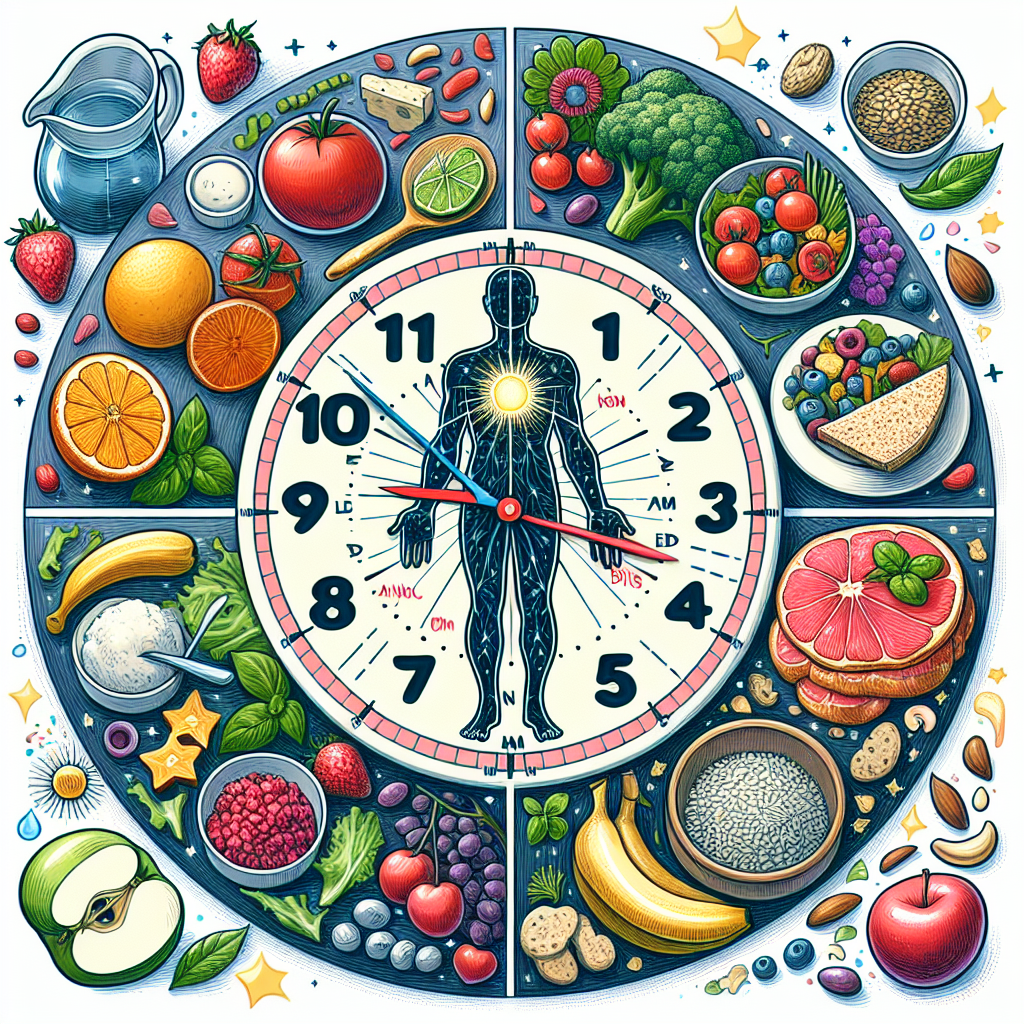
Circadian Eating: Aligning Your Meals with Your Body’s Natural Clock
Why Meal Timing Matters More Than You Think
In our fast-paced lifestyles, many people eat based on convenience, not their body’s needs. Skipping breakfast, eating dinner late, or munching mindlessly at night may seem harmless, but these habits can negatively impact our health.
What if adjusting the timing of your meals—rather than changing what you eat—could boost energy, improve sleep, and even aid weight loss?
Enter circadian eating, a science-backed approach that helps promote better digestion, metabolic health, and overall wellness.
What is Circadian Eating?
Circadian eating, also called chrono-nutrition, is a dietary approach that aligns meal times with your natural internal clock or circadian rhythm. This 24-hour biological clock governs essential bodily functions like metabolism, hormone releases, and digestion.
Just as there’s an ideal time to fall asleep, there’s also an optimal time to eat. Your digestive system is more active during the day and slows down at night. Eating in harmony with these cycles can boost nutrient absorption, reduce fat storage, and improve how your body processes food.
Research published in Cell Metabolism found that participants who ate within an 8- to 12-hour window had less body fat and better insulin regulation than those who ate across longer windows.
How Your Internal Clock Affects Digestion
Your circadian rhythm plays a vital role in how effectively your digestive system functions throughout the day:
– Morning (6:00 AM – 10:00 AM): Your body is primed to digest food efficiently. Insulin sensitivity is highest, meaning your body handles sugars better in the morning. This makes it the ideal time for a healthy, protein-rich breakfast such as eggs with whole grain toast or oatmeal with chia seeds.
– Midday (12:00 PM – 2:00 PM): This is the best time for your biggest meal of the day. Your body is still efficiently processing carbohydrates and fats. A balanced lunch could include grilled chicken, quinoa, roasted vegetables, and leafy greens.
– Evening (After 7:00 PM): As the day winds down, so does your digestive strength. Melatonin—the hormone that prepares your body for sleep—increases, which also lowers insulin sensitivity. Eating large meals at this time can cause poor sleep and indigestion.
Registered dietitian Keri Glassman puts it simply: “Think of your digestion as a factory that slowly closes down for the night. You don’t want to send in a big food shipment after hours.”
Key Benefits of Circadian Eating
Timing your meals according to your body’s natural rhythm can deliver a range of benefits:
Improved Metabolism
Eating earlier in the day when insulin is most effective helps your body regulate blood sugar and reduces the risk of metabolic conditions. Studies from the Journal of Nutrition show that early time-restricted eating improves glucose control.
Weight Management
Eating the majority of your calories earlier in the day could help control body weight more effectively. One study revealed that individuals who ate 70% of their daily calories before 3 PM lost more weight compared to those with later eating patterns.
Better Digestive Health
Your digestive enzymes work best during the day. Eating late in the evening often leads to indigestion, bloating, and acid reflux.
Increased Energy and Focus
Consuming food when your body is naturally prepared to digest it results in stable blood sugar levels, which in turn supports clearer thinking and sustained energy.
Enhanced Sleep Quality
Avoiding late-night eating allows melatonin levels to rise properly, resulting in better sleep quality.
An Ideal Circadian Eating Schedule
While your personal schedule may vary, here is a sample guide to optimize your meal timing with your natural rhythms:
– 6:00 AM – 9:00 AM: Breakfast
Start your day with a high-protein, fiber-rich meal. Good options include Greek yogurt, scrambled eggs, or a smoothie made with fruit, leafy greens, and protein powder.
– 12:00 PM – 2:00 PM: Lunch
Make this your most substantial meal. A combination of lean proteins, whole grains, and healthy fats—such as grilled salmon with sweet potatoes and sautéed spinach—works well.
– 5:00 PM – 7:00 PM: Light Dinner
Keep your evening meal simple and easy to digest. Try vegetable stir-fry, lentil soup, or grilled tofu with steamed greens.
– 8:00 PM – 6:00 AM: Overnight Fast
Allow your body time to rest and repair by avoiding food during these hours. Stick to water or herbal tea, and steer clear of alcohol or sugary snacks.
How to Transition Smoothly into Circadian Eating
Making the switch to eating in sync with your circadian rhythm is easier with a few practical strategies:
Plan Meals in Advance
Prepare breakfast and lunch meals ahead of time so you don’t fall back into late-night eating patterns.
Eliminate Nighttime Snacking
Replace snacking after dinner with relaxing activities such as drinking herbal tea, stretching, or reading.
Listen to Your Body
Notice when you feel most hungry. If you’re hungrier earlier in the day, honor that by shifting your larger meals earlier.
Stick to a Routine
Eating at consistent times every day—even on weekends—helps stabilize circadian gene patterns and supports steady metabolism.
Common Challenges and Simple Solutions
Modern life doesn’t always make it easy to eat early. Here’s how to handle potential roadblocks:
Late Work Hours
If your job keeps you out late, make lunch your main meal and opt for a light, protein-rich snack around dinnertime—such as hummus with veggie sticks or a hard-boiled egg.
Social Dinners
If you can’t avoid dining late, keep portions small and skip heavy sauces or fried foods. Focus on your company and eat slowly.
Family Traditions
To gradually shift whole-family mealtimes earlier, start by moving dinner up by just 15 minutes each week. Serve larger lunches and smaller dinners to balance nutrition.
Final Thoughts on Circadian Eating
Circadian eating doesn’t focus on strict dieting, but instead on aligning your meals with your internal clock. By doing so, you support better digestion, metabolic health, immune function, cognitive clarity, and restful sleep.
Try making small changes—such as prioritizing breakfast, shifting dinner earlier, and maintaining regular meal times—for just two weeks. You might find you sleep better, feel more energized, and experience improved overall well-being.
References
1. Manoogian, E. N. C., et al. “Time-Restricted Eating for the Prevention and Treatment of Metabolic Diseases.” Endocrine Reviews, 2019.
2. Panda S. The Circadian Code. Rodale Books, 2018.
3. Sutton, E. F., et al. “Early Time-Restricted Feeding Improves Insulin Sensitivity.” Cell Metabolism, 2018.
4. Zarrinpar, A., Chaix, A., & Panda, S. “Daily Eating Patterns and Their Impact on Health and Disease.” Trends in Endocrinology & Metabolism, 2016.
5. Keri Glassman, R.D., founder of Nutritious Life – Shape Magazine, 2021.
6. Hut, R. A., et al. “The Role of the Circadian System in Glucose Regulation and Diabetes.” Current Opinion in Clinical Nutrition and Metabolic Care, 2018.
7. Garaulet, M., et al. “Timing of Food Intake Predicts Weight Loss Effectiveness.” International Journal of Obesity, 2013.
8. Chaix, A., et al. “Time-Restricted Feeding Is a Preventative and Therapeutic Intervention against Diverse Nutritional Challenges.” Cell Metabolism, 2014.
This content is now web-ready, optimized for readability and engagement, and suitable for publishing as a blog post or article.


